Kaqavadzor in Crisis: Villagers Grow Edible Greens to Make Ends Meet
The economic crisis has also thrown the family of Mrs. Siroush, from Kaqavaberd, into hard times. Her sons haven’t gone to Russia to seek work because there isn’t any to be found. We met up with three women neighbors of Mrs. Siroush in a field some three kilometers from the village of Kaqavadzor. They were harvesting “sibekh”, a type of edible green, not to sell but to use as part of their daily fare. “We’ve had enough of eating potatoes and macaroni,” says Siroush.
Siroush is the mother of many children; she has five. Three of her sons already have families of their own but they all still live together under the one roof. “Who helps us out? Who cares if I have many children? I don’t receive anything from the government. We’ve worked hard but still can’t afford to build a house. What can we do? My sons haven’t gone to work abroad. It’s bad there as well,” says Siroush. 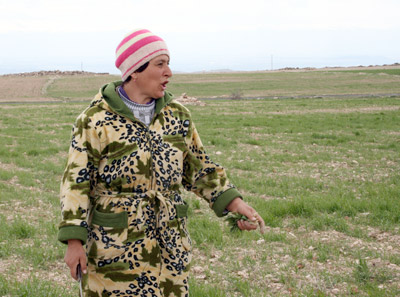 Contrary to Siroush, one of her neighbors, Mrs. Antaram, complains that her husband travels to the Russian city of Bryansk every year to work and that he’s solely responsible for the upkeep of the household. “Yes, my husband is a migrant worker. He’s a chauffeur. He goes every year. It is very hard but I somehow manage to satisfy the demands of raising three kids. You want your kids to live well and your husband to be home. Today, you can’t have both,” she notes.
Contrary to Siroush, one of her neighbors, Mrs. Antaram, complains that her husband travels to the Russian city of Bryansk every year to work and that he’s solely responsible for the upkeep of the household. “Yes, my husband is a migrant worker. He’s a chauffeur. He goes every year. It is very hard but I somehow manage to satisfy the demands of raising three kids. You want your kids to live well and your husband to be home. Today, you can’t have both,” she notes. 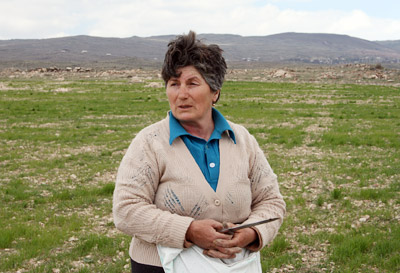 Siroush argues that it is possible if you own a store. “It is possible to make ends meet in our village. There are a few who either run a store or work in the village municipality. Those who get a pension are also able to survive,” states Mrs. Siroush. Tamara, listening in on the conversation, counters, “We also had a small store but had to close it because of the tax department. They confiscated everything and never returned the goods.” The women remember that tobacco was grown in the village not too long ago, when there was a kolkhoz, a sewing factory and a lemonade plant. “Back then I grew tobacco and now I work as a cleaner, even though I attended art school. But now there’s no work, nothing, in these mountains,” Siroush says bitterly. When we said our goodbyes Antaram turned to Siroush and said that it wasn’t for nothing that they had come to pick greens. “It’s also important to listen and talk. We came to pick greens, we chatted a bit, and parted company” Then they offered us a bag of the greens they had picked.
Siroush argues that it is possible if you own a store. “It is possible to make ends meet in our village. There are a few who either run a store or work in the village municipality. Those who get a pension are also able to survive,” states Mrs. Siroush. Tamara, listening in on the conversation, counters, “We also had a small store but had to close it because of the tax department. They confiscated everything and never returned the goods.” The women remember that tobacco was grown in the village not too long ago, when there was a kolkhoz, a sewing factory and a lemonade plant. “Back then I grew tobacco and now I work as a cleaner, even though I attended art school. But now there’s no work, nothing, in these mountains,” Siroush says bitterly. When we said our goodbyes Antaram turned to Siroush and said that it wasn’t for nothing that they had come to pick greens. “It’s also important to listen and talk. We came to pick greens, we chatted a bit, and parted company” Then they offered us a bag of the greens they had picked.
Descendants of Sasoun Have No Water
The village of Kaqavadzor in Aragatzotn Marz has 1,200 residents. Their ancestors migrated here from the twenty-two villages of Sasoun after the Genocide. They are a traditional people who reverently preserve the customs and habits of their forefathers. They dance the “Yarkhoushta” and boast that everyone in the village knows how to sing. Today, however, the occasions for dance and song are few; difficulties are mounting instead. 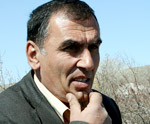 Village Mayor Seryozha Mouradyan ticks them off.
Village Mayor Seryozha Mouradyan ticks them off.
“There is no work. We have no irrigation water. Our village doesn’t have much land, only 850 hectares of administrative property of which only 184 hectares is tillable. We can only irrigate the plots next to the houses. In the winter there isn’t enough potable water since the pipes freeze up and the water flows at the rate of one liter per second.” In the past, the village had an irrigation water pipe pulling from the Arzni/Shamiram canal that flowed at 100 liters. It, along with the electric pumping equipment, were stripped and plundered back in the Soviet period. Mayor Mouradyan says they have knocked on all the doors to get a new water pipe but to no avail. “It will cost $150,000 for a new pipe stretching from the canal. If we had the pipe this village would do OK; we’d irrigate 450 hectares. The villagers could get back to working the land.” 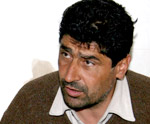 Hayk, a resident of Kaqavadzor, assures us that if the village had water for irrigation they could grow practically anything and that much would change in their lives. “Today, the villagers mostly grow barley and wheat. But this all depends on the rain.” Raising livestock has become the primary means of making a living for the villagers. The decision of the government to transfer title of pasture land on which the village’s 700 head of livestock grazes to another community, because the land isn’t adjacent to the village, has become the prime concern of the village. “They grab the land of this village of 1,200 and hand it over to a neighboring Yezidi village. It’s not possible,” states the mayor. The Yezidi village of Baysz, with 15 households, lies in the vicinity of Kaqavadzor. They settled the area some one hundred years before the people from Sasoun arrived. This is the reason why the Armenian Church of St. Mary is located on their land. “The church dates from the 13th century and was one of the village’s neighborhoods. The Yezidis named their village Baysz which means “headless”, given that the church didn’t have a dome,” states Mr. Mouradyan and notes that the church has been 90% restored due to the assistance of a benefactor. In 2004, with money from the budget, the village school was renovated but it still needs to be furnished. The number of students decreases yearly.
Hayk, a resident of Kaqavadzor, assures us that if the village had water for irrigation they could grow practically anything and that much would change in their lives. “Today, the villagers mostly grow barley and wheat. But this all depends on the rain.” Raising livestock has become the primary means of making a living for the villagers. The decision of the government to transfer title of pasture land on which the village’s 700 head of livestock grazes to another community, because the land isn’t adjacent to the village, has become the prime concern of the village. “They grab the land of this village of 1,200 and hand it over to a neighboring Yezidi village. It’s not possible,” states the mayor. The Yezidi village of Baysz, with 15 households, lies in the vicinity of Kaqavadzor. They settled the area some one hundred years before the people from Sasoun arrived. This is the reason why the Armenian Church of St. Mary is located on their land. “The church dates from the 13th century and was one of the village’s neighborhoods. The Yezidis named their village Baysz which means “headless”, given that the church didn’t have a dome,” states Mr. Mouradyan and notes that the church has been 90% restored due to the assistance of a benefactor. In 2004, with money from the budget, the village school was renovated but it still needs to be furnished. The number of students decreases yearly. 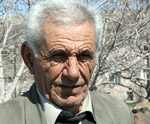
Valery Khachatryan, a teacher with forty years experience, points out that, “The number of students is dropping because all the young people go abroad to work. There is no growth. They leave, get married and stay there.” Last year 160 villagers left for Russia to work and ten never returned. The mayor says that this year only a few left since there is now work in Russia as well. Armen, who has worked abroad for several years, hasn’t left yet either. “Last year we were doing construction work on a school in Moscow. We haven’t heard any news of work yet so we are waiting. If any work pops up they’ll let us know,” Armen says.
“The sheep are doing fine; it’s the shepherds who are hurting”
Shepherds were grazing their flocks on fields lying below the village. -Hey, that’s great. They’re really fat sheep: we called out. -Yeah. The sheep are doing all right but we shepherds aren’t doing so well; answered back Levon, one of the shepherds. 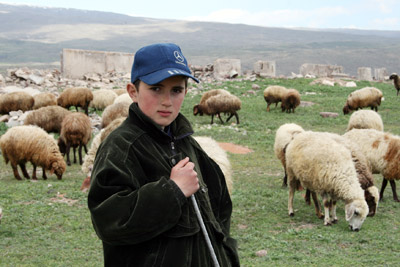 Levon was sitting on a large slab of rock along with Artak and his nephew Harout. They take out the village’s flocks in turn, a sheep a day. “I have ten sheep and graze them ten times a year,” explains Artak. Even though they were talking to us they kept a close eye on the animals to see that their flocks didn’t mix. “If they get mixed up, we have to separate them out before we return to the village. Otherwise, the wrong ones will be killed and eaten,” says Levon. However, Levon understands even if they are killed and eaten, since, “How can a villager live amongst these mountains and rocks. I also raise livestock but what’s the benefit. There’s no land to graze the animals on. This field is quite far from the village. In a month from now all the grass will be gone. I have three kids of my own and just get by.”
Levon was sitting on a large slab of rock along with Artak and his nephew Harout. They take out the village’s flocks in turn, a sheep a day. “I have ten sheep and graze them ten times a year,” explains Artak. Even though they were talking to us they kept a close eye on the animals to see that their flocks didn’t mix. “If they get mixed up, we have to separate them out before we return to the village. Otherwise, the wrong ones will be killed and eaten,” says Levon. However, Levon understands even if they are killed and eaten, since, “How can a villager live amongst these mountains and rocks. I also raise livestock but what’s the benefit. There’s no land to graze the animals on. This field is quite far from the village. In a month from now all the grass will be gone. I have three kids of my own and just get by.” 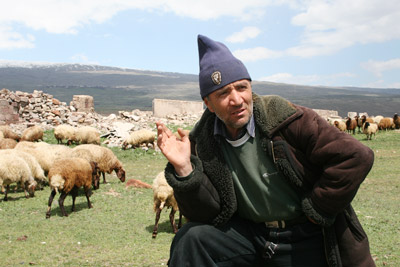 Artak adds that, “We are all dependent on the rain. What will the poor villagers do if they sow wheat and then we get hit with hail?” Artak has three brothers but all their land put together doesn’t amount to one and a half hectares. “Try to raise three families on one and a half acres. We’re not talking about the Ararat field here where you can work a half an acre and make decent money. Last year not one stalk of wheat was harvested from the village’s lands. There’s no water, no rain,” Artak complains and tips his hat to the neighboring Yezidis who know how to make a living. “I know a Yezidi who owns 400 lambs. When I asked him why he doesn’t sell them he said he’d be able to sell them at $100 a head in August or September. We Armenians are a pitiful lot. I have two kids but the Yezidis have ten to twenty. The head of the extended family says, ‘Chalo, do this, Besho, take care of that.’ The Yezidis know how to get things done. They’re not like us,” says Artak.
Artak adds that, “We are all dependent on the rain. What will the poor villagers do if they sow wheat and then we get hit with hail?” Artak has three brothers but all their land put together doesn’t amount to one and a half hectares. “Try to raise three families on one and a half acres. We’re not talking about the Ararat field here where you can work a half an acre and make decent money. Last year not one stalk of wheat was harvested from the village’s lands. There’s no water, no rain,” Artak complains and tips his hat to the neighboring Yezidis who know how to make a living. “I know a Yezidi who owns 400 lambs. When I asked him why he doesn’t sell them he said he’d be able to sell them at $100 a head in August or September. We Armenians are a pitiful lot. I have two kids but the Yezidis have ten to twenty. The head of the extended family says, ‘Chalo, do this, Besho, take care of that.’ The Yezidis know how to get things done. They’re not like us,” says Artak. 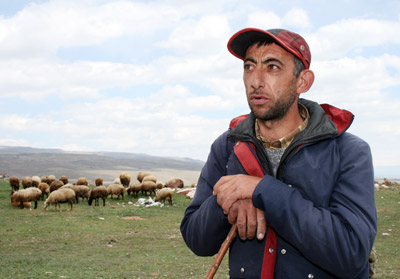 Levon also argues that, “Back in the day we lived well. Half the people worked in the factory, in the mine, the other half in the farms. No one was idle.” Today, however, only four or five work in the mines and get paid peanuts for the heavy work. Now the shepherds place their hopes on the new factory that’s opened up. “It just started operating. We make machinery die parts. I work there. So far there are four of us. A young guy from Yerevan came and opened the factory. He wasn’t familiar with the village but had an acquaintance named Hrant who brought him here. He purchased the site that used to be the branch of the Yerevan “Orbita” plant,” Artak explains. Levon also can’t say who is supposed to improve their lot in life and refrains from offering advice to President Serzh Sargsyan, even though he voted for him. “He got elected president; he should know what to do. What do I know? If I say the matzoun is black, will it turn black? No, it won’t,” says Levon with an air of desperation.
Levon also argues that, “Back in the day we lived well. Half the people worked in the factory, in the mine, the other half in the farms. No one was idle.” Today, however, only four or five work in the mines and get paid peanuts for the heavy work. Now the shepherds place their hopes on the new factory that’s opened up. “It just started operating. We make machinery die parts. I work there. So far there are four of us. A young guy from Yerevan came and opened the factory. He wasn’t familiar with the village but had an acquaintance named Hrant who brought him here. He purchased the site that used to be the branch of the Yerevan “Orbita” plant,” Artak explains. Levon also can’t say who is supposed to improve their lot in life and refrains from offering advice to President Serzh Sargsyan, even though he voted for him. “He got elected president; he should know what to do. What do I know? If I say the matzoun is black, will it turn black? No, it won’t,” says Levon with an air of desperation.
Photos by Hakob Poghosyan
 Videos
Videos Photos
Photos
Write a comment